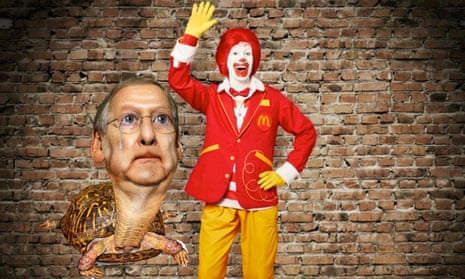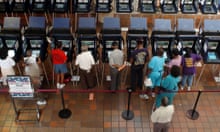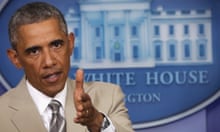“That’s all we do in the Senate is vote on things like raising the minimum wage.”
That’s what Mitch McConnell had to say to a roomful of millionaires and billionaires, according to leaked audio published by The Nation and The Undercurrent last week, about something as crucial as the wages that millions of Americans make every day.
The secret tape echoes a rising awareness among Americans, from Kentucky to California, that their elected officials are too busy catering to the whims of the rich rather than taking care of the working people who elect them to office. So rather than let that disappointment and anger turn to apathy, the working class is already too busy reclaiming a living wage for itself.
McConnell, facing a fierce mid-term challenge from Democrat Alison Lundergan Grimes, could be forgiven for stretching the truth: he’s actually been busy preventing a vote on the minimum wage. Four months ago, Senate Republicans filibustered a bill that would’ve increased the federal minimum wage from $7.25 per hour to $10.10. It never would have passed the Republican-dominated House, which is running out of time to ignore its base in favor of intransigence – even 54% of Republicans said in a Memorial Day weekend poll that they want to see the minimum wage go up.
The Senate minority leader has been campaigning on restoring order to Congress: “if you didn’t want to vote, you shouldn’t have come to the Senate,” McConnell said in an interview for Sunday’s New York Times magazine. Meanwhile, Grimes has been bashing McConnell for “voting 17 times against raising the minimum wage” – and it seems to be working: Real Clear Politics calls the Kentucky Senate race a toss-up.
It’s no wonder that people feel so disconnected from the priorities of their politicians. Kentucky’s median worker makes 88 cents on the dollar compared to the average US worker, facing “a decade of lost wages” as wealthy Kentuckians watch their incomes skyrocket. According to that same Memorial Day poll, 71% of all Americans want to see the minimum wage increased, and 55% think it should be increased to $10.10 an hour or higher.
Yet the minimum wage is not just being held up by Republicans in the south:
- New York governor Andrew Cuomo, a Democrat also backed by the left-leaning Working Families Party, has opposed allowing New York City, one of the most expensive places in the world to live, to raise its municipal minimum wage. In order to win the endorsement of the labor-backed WFP, he promised to change – then appeared to walk back his pledge a day later. Meanwhile, Cuomo has been busy spending $2.5m every two weeks to fend off his progressive primary challenger, Zephyr Teachout.
- Early this summer, Democrats in Rhode Island passed a measure, backed by the US Chamber of Commerce and the hotel industry, that prevented cities from raising their own wages. Until then, Providence was on track to become one of the small but growing number of cities that voted on a $15-an-hour minimum wage.
- Kevin Faulconer, who is protected through 2016 as the sole Republican mayor of the 10 biggest US cities after he succeeded a sexual predator, tried last month to veto San Diego’s new minimum wage of $11.50 an hour. His city council told him to take a hike.
As long as politicians like McConnell, Cuomo and Faulconer see a closed-door ballroom of billionaires as their base, they aren’t likely to vote to raise the minimum wage, in Congress or in the statehouses, on the left side of the aisle or the right. But nationwide demand needs nationwide action, and now organizers around the country are taking the pay-rate issue out of the hands of elected officials entirely.
Citizens in at least four states and multiple cities will vote on minimum-wage ballot measures this November. Supported by unions, faith groups and a growing, vibrant movement of low-wage workers, these ballot initiatives will offer voters a chance to enact exactly what their elected officials refuse to give them: a raise.
And the states considering a voter-mandated wage hike on Election Day are hardly bastions of liberalism: Alaska, South Dakota, maybe Arkansas and definitely Nebraska, where the governor opposes raising the minimum wage but where it doesn’t matter anymore – the people affected by wages will now get to decide for themselves.
After all, it has been everyday people who put the issue of low wages back on the agenda this year:
- Seattle fast-food workers demanded $15 an hour, the city council gave it to them, and now San Franciscans will vote to do the same in November.
- The low-wage workers movement demanded paid sick days, states like California listened, and now states like Massachusetts have their own ballot initiative.
- Walmart moms and fry cooks at McDonald’s went on strike for a living wage and better treatment on the job, and now they’re back, with workers from McDonald’s, Burger King, Pizza Hut and other fast-food chains planning to walk off the job in 150 cities on Thursday in what organizers say will be their largest strike yet.
The minimum-wage momentum is finally shifting toward the workers. The mayors of Los Angeles and Chicago want to raise the minimum wage to $13 an hour. On a busy Labor Day, incumbents began truly fearing for their political lives, and President Obama said in a speech, “There is no denying a simple truth: America deserves a raise.”
Sixty percent of Americans, in a new poll leading up to Labor Day, now say addressing income inequality by increasing the minimum wage to $10.10 would have a “positive” effect on the economy, and Senate Democrats are reportedly mustering the courage to force another vote. Mitch McConnell not withstanding, it seems that the American people think voting to increase the minimum wage is an extremely important thing for Congress to do – indeed, the least that it could do.
Working people are tired of waiting for Congress to decide which side it’s on. They’re taking action, going out on strike, building power blocs in the workplace, in their cities and states. The minimum wage should be a winning issue this November; now politicians have to buck their billionaire donors and make it a priority, too.


